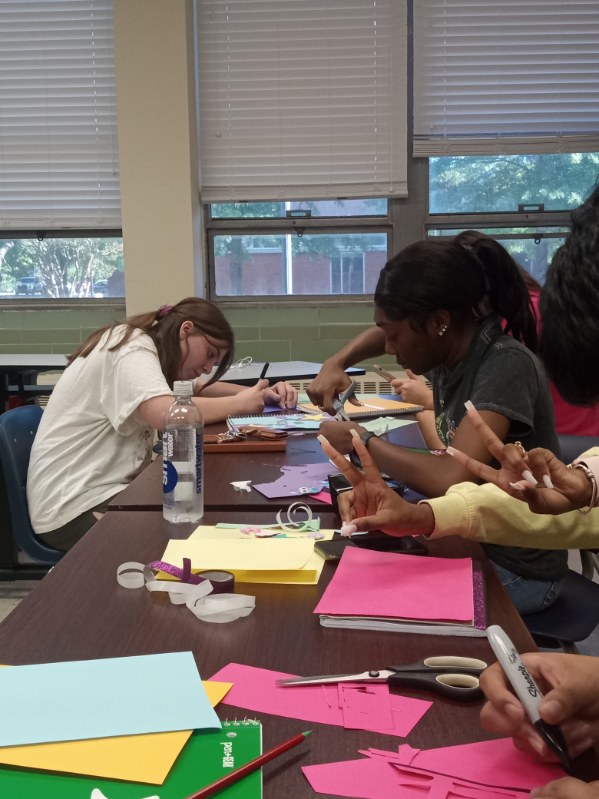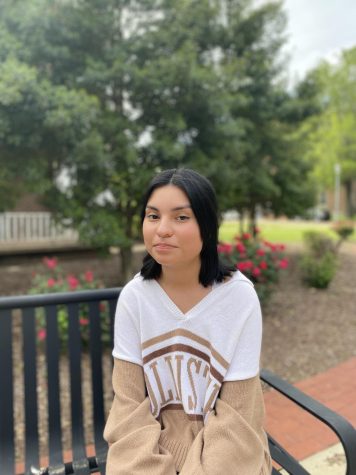Overcommitted and under-involved: Some MSMS students clubs do little in the year
Students work together in Crafting Club to design notebooks. Crafting Club is led by Co-Presidents Helena Munoz and Areli Ramirez.
May 23, 2023
MSMS has 46 different clubs this year, but many only meet once every two, three or five months, or even once each year. Why is this?
Are the students really too busy with schoolwork and activities that they don’t have time to plan out new meetings? Are they purposefully joining and creating as many clubs as they can to adorn their college applications?
MSMS’ Counselors Heath Stevens, the now-inactive Photography Club’s and the active Brain and Behavior Club’s sponsor, and Shelle Bates both said the problem with infrequently meeting MSMS clubs is students’ overcommitment and under-involvement.
“The thing is when students create a club, you normally have three students that are really passionate about starting the club. They manage to gather other students’ interest for a year or two, but after some time, they just stop attending meetings,” Stevens said.
“I do feel like a lot of times students overcommit. Juniors and seniors become presidents of several clubs and end up not being able to fulfill all of their commitments and be fully involved,” Bates added. “But MSMS does have a lot of active clubs. I know the Young Democrats, Young Republicans, Wags and Whiskers, Interact Club and more are all fully active.”
Past MSMS alumna Theo Hummer said during her time at MSMS, she was able to join clubs while still being able to manage her schoolwork.
“It is a struggle, and it does require a lot of balance, but it is possible to join multiple clubs while still being an active club member,” said Hummer, who currently teaches English classes at MSMS.
LaToya Bledsoe, Goen Hall director and the sponsor of the Blu Diamondz, Blu Knightz, Fashion Board, Students Against Destructive Decisions, Naach, MSMS Residence Hall Council and the Spirit Squad clubs, said all the clubs she sponsors are very active this year, but she is noticing a decrease in student interest.
“I would say that students must balance school, clubs and extracurricular activities. I see a decrease in student participation with most clubs I advise as the semester progresses due to balance,” Bledsoe said.
Kayla Hester, the sponsor of Future Business Leaders of America and Tabletop Gaming Club, said she assumes MSMS clubs eventually go inactive because of the lack of time and commitment students can provide.
“FBLA club normally meets every month to prepare for a competition, while the Tabletop Gaming Club meets once in a while,” Hester said. “Club meetings are just hard to organize because of the lack of time and commitment students can provide with all of the work they get.”
Given the rigor of MSMS, the large amount of schoolwork given can be difficult to balance alone. Are clubs affected by it, or are students just creating and joining clubs to earn college credit for their applications?
An anonymous survey was sent out to MSMS students, to gather an incentive for their activity within MSMS clubs. Out of 47 respondents, 59% admitted to being members of inactive clubs. The survey then asked students how involved they were as members of clubs, and 32% admitted being not as involved.
Senior Jatarious Lang, the president of the Basketball Club and a member of the Black Student Alliance, Asian Student Association, Esports Club and The Blue Knightz, said the Basketball club is somewhat inactive because students are too busy to go to meetings.
“We haven’t had many meetings because [students] don’t have time and are too busy with homework and tests, so it’s hard to set up meetings and events. My club has been fairly inactive,” Lang said, “but we do host tournaments and were going to start hosting them more often; then again, [students] don’t normally show up to them as it happened with the last [basketball tournament].”
Junior Peter Bomhold, the vice president of the English Outreach club and a member of the Art Club and Theater Club, said he thinks joining clubs just for college applications is fine as long as students actively participate in their chosen groups.
“Students are definitely joining clubs just to put it on their college sheets — that’s what I do. I don’t think there is something wrong with that as long as you don’t show up to meetings and still put it on your transcript,” Bomhold said.
Lang said he knows many students only join clubs to adorn their college applications since he has first-hand experience with it.
“[Students] will sometimes just pick up clubs just because it looks good on a resume. I know this because [last year] I knew a senior who was the vice president of the Basketball Club, and she said the only reason she was doing it was that it looked good on the transcript,” Lang said. “[Students] sometimes just join clubs to make the applications look better, but I joined because I liked the sport.”
Senior Dia Kher, president of the Speech and Debate Club, FBLA and the Philosophy Club, said this year none of her clubs have inactive members.
“Students usually join clubs because they want to do it. Usually, they just stick with it unless they are too busy,” Kher said. “I feel like the rigorous coursework that MSMS gives hinders how many clubs you can be a part of, and that’s definitely why [students] might not be so active in clubs.”
Bomhold said the key to stopping a club from going inactive is to find juniors who are passionate about the club.
“Bonding with juniors is really important — making sure that we really go out of our way to find juniors who care about the club and really making sure [presidents] teach them how to run the club before they leave,” Bomhold said.
While some students argue the reason MSMS has ghost clubs is because of the amount of work students get each week, others say students are just creating clubs and joining them to earn college credit for their applications. If students are just doing it for the credit, is it even helping them?
Hummer said being involved in many clubs helped her get into a good college, while Heintz said she believes it is probable students are joining clubs just to improve their resumes.
“I do think starting a club and being involved in several clubs like the Science Bowl ultimately helped me to get into [Berkley],” Hummer said.
Stevens said he does believe students create and join clubs just for the college credit —something he is trying to stop.
“[It] happens way too often, and we do try to discourage it. Every year, someone tries to start a new club. Normally, students try to start some sort of community service club that will look good on their college applications,” Stevens said. “Nine out of 10 students will tell me that back at their schools, they didn’t have many clubs. When they get here and they see just how easy it is to start a club here, they just do it to put it on their resume and then nothing happens with it.”
Bledsoe said although students can just create new clubs without needing to fully commit to them, it is still important for students to take them seriously.
“MSMS has a wide variety of student organizations and clubs, which is great; however, I do feel as if some are created based on student interests by class and that will vary from class to class,” Bledsoe said. “Most clubs are inactive based on the lack of interest in clubs formed by previous students. Although student involvement and community service-oriented clubs are great for college applications, students must learn the value of commitment when choosing to be a part of any club at MSMS.”
Based on their experience, both Stevens and Bates said colleges don’t really care about how many clubs a student has on their application.
“Colleges are looking at what you’re doing in the club. If you’re not being active in it then it doesn’t really matter how many clubs you have on your resume,” Bates said.
“[Clubs] are not important; colleges prefer depth rather than breadth. They rather see something tangible in one or two clubs rather than a student just being a member in a lot of clubs but not being involved fully,” Stevens added.









